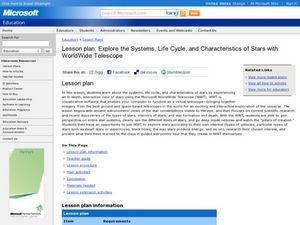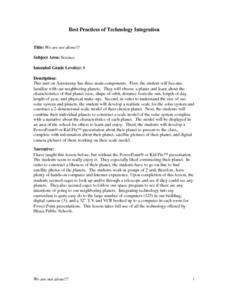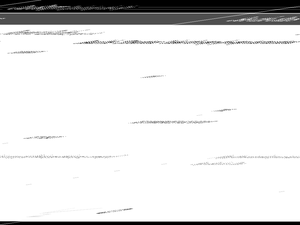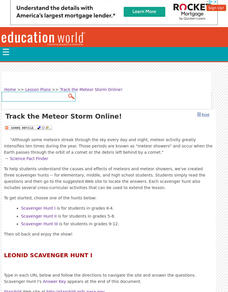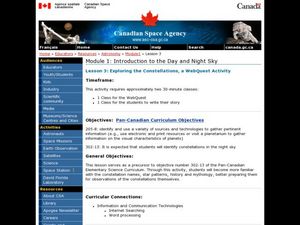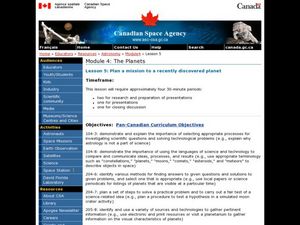Curated OER
Explore the Characteristics of Stars with Microsoft WorldWide Telescope
Students explore the characteristics of stars. In this space science activity, students use the Microsoft WorldWide Telescope program to identify the properties of stars and identify the stars in the galaxy.
Curated OER
Swinging on a Star
Students explore the issues that might arise if humans were to go on an interstellar space mission. They synthesize their understanding of interstellar travel by writing scenes from a science fiction novel that would depict such a mission.
Curated OER
Stars and Constellations
Ninth graders investigate how ancient cultures viewed their world in terms of astronomy. They read and discuss an informational handout, construct an astrolabe, and locate stars and constellations using star charts.
Curated OER
We Are Not Alone!!!
Eighth graders explore the area of astronomy. They explore Earth's neighboring planets. Students research a planet's characteristics. They develop a scale model of the solar system and a narrative about the planets.
Curated OER
Cool! Awesome! What is it?
Students work in small groups to brainstorm hypotheses about mysterious science photographs, read and interpret answers to the science photographs, cooperatively develop a set of clues for the images and develop their own science photo...
Curated OER
A Moon with a View
Third graders explore the rotation of Earth and the moon. In this solar system lesson, 3rd graders participate in an Earth and moon simulation in which part of the class "becomes" the sun, while other children represent the moon by...
Curated OER
See the Stars
Students explore the nighttime sky. In this space science lesson, students read the book Maria's Comet and and investigate the sky using their naked eyes. Students compare the view of their naked eyes to the view of a telescope.
Curated OER
Seeing Stars
Learners discover constellations. In this astronomy lesson, students discuss stars in the sky and that a group of stars is called a constellation. Learners then create their own constellations by dropping stars onto a black paper, and...
Curated OER
Follow the Falling Meteorite
Students use triangulation method to locate meteorite landing site on the map. In this earth science instructional activity, students participate in a meteorite treasure hunt set up by the teacher. They explain how this method is used by...
Curated OER
Energy: The Universal Currency
Science stars examine the concept of energy by thinking about everyday situations. The lesson plan is incohesive. It lists goals for the student, but doesn't address all of them in the content. The best use of this resource would simply...
Curated OER
Star Child Astronomy
Young scholars gain understanding of the relationship of Earth within the Solar System. They increase knowlegde of the planets, sun, moon, meteoroids, asteroids and comets.
Curated OER
Track the Meteor Storm Online!: Leonid Meteor Showers, Astronomy
Students are guided through an online series of readings and questions to explore the Leonid Meteor Showers and related topics. Modifications are provided for teaching this instructional activity to k-4, 5-8, and 9-12 students.
Curated OER
How Big Is That Star?
Aspiring astronomers study stars. They compare stars and explain the relationship between radius, mass, and diameter. By creating a star simulation, they discover how a binary star system's orbit can cause changes in the observed...
Curated OER
Exploring Meteorite Mysteries: Building Blocks of Planets
Students simulate the formation of chondrites and asteroids. In this astronomy lesson, students demonstrate accretion using balloons and static electricity. They compare and contrast their models to the actual process of chondrites and...
Curated OER
The Hertzsprung-Russell Diagram
In this astronomy worksheet, students use a Hertzsprung-Russell diagram to examine the relationship between the average temperatures of stars and their absolute magnitude. After viewing the diagram, they complete 10 short answer questions.
Curated OER
Your Galactic Address
Students discover their place in the universe. In this astronomy lesson, students identify their location on various maps that have increasingly larger scales. In the end, the students write their address in terms of their...
Curated OER
Timekeeping by the Sun
Learners measure shadows to learn about the Sun-Earth relationship. In this astronomy lesson, students create a shadow stick of a Pokemon character and record measurements of its shadow in a data chart. Follow-up discussions guide...
Curated OER
Reading Satellite Images
Students analyze satellite images. In this astronomy instructional activity, students examine 3 satellite images in order to understand how satellite images are taken and what they can teach scientists.
Curated OER
Exploring the Constellations, a WebQuest Activity
Students explore space science by participating in a class WebQuest. In this constellation identification lesson, students view star charts based on the four seasons and identify the changes our sky goes through in the course of 12...
Virginia Department of Education
Modeling the Big Bang Theory
Young astronomers learn about the Big Bang Theory and redshift through a hands-on activity in the last installment of a three-part series. Participants draw dots on balloons and then inflate them to model how galaxies moved farther apart...
Curated OER
Meteors
Students identify the different types of meteorite using an interactive website. In this earth science lesson, students simulate how meteors crash on a surface. They relate meteor size to crater size.
Curated OER
Plan a Mission to Recently Discovered Planet
Students plan a mission to a recently discovered planet. In this science lesson, students research spacecraft design, distances in space, long-term missions in space, and life-sustaining planets. Students work in groups to research an...
Curated OER
Astronomy: Earth/Moon
Students investigate the Earth and the Moon. They select activities from a menu of options including viewing videos, drawing magnetic fields and plate tectonics, creating vocabulary flashcards, observing the phases of the moon over a...
Curated OER
Measuring the Diameter of Our Star
Students conduct an experiment to measure the diameter of the sun. For this astronomy lesson, students construct a simple equipment to collect scientific data. They calculate the sun's diameter using a given formula.
Other popular searches
- Astronomy and Space Science
- Space Science Astronomy
- Science Astronomy Stars
- Earth Science Astronomy
- Science Astronomy Graphing
- Life Science Astronomy
- "Astronomy and Space Science


